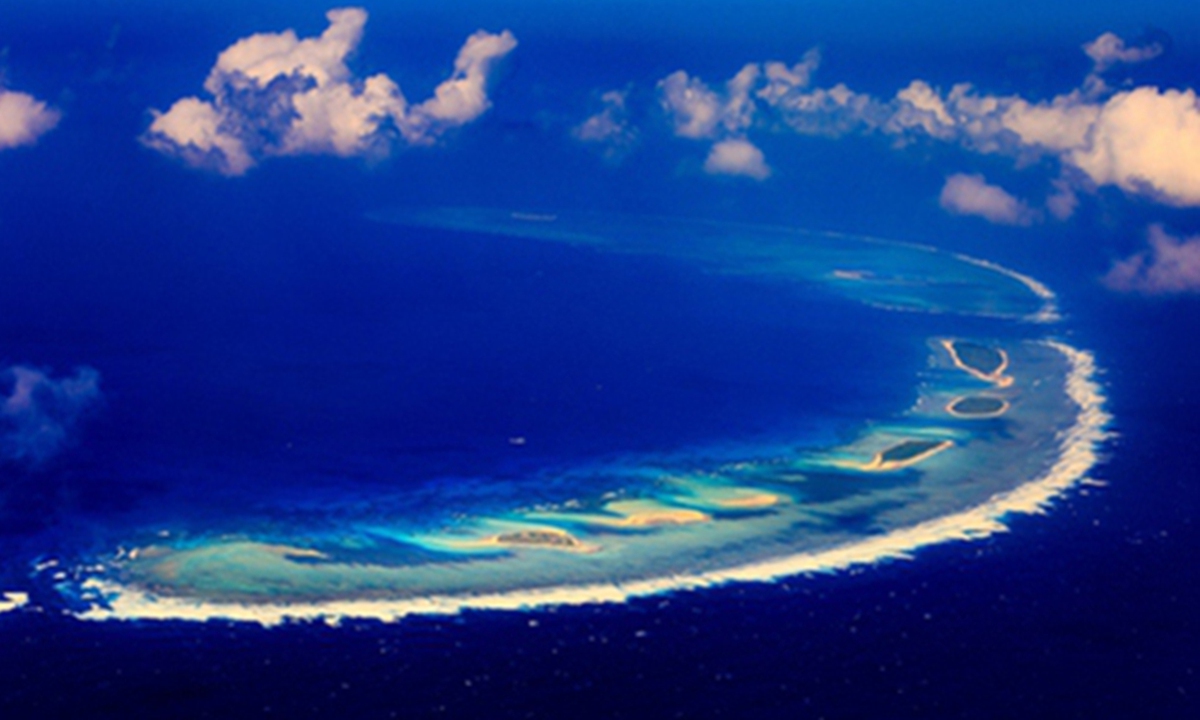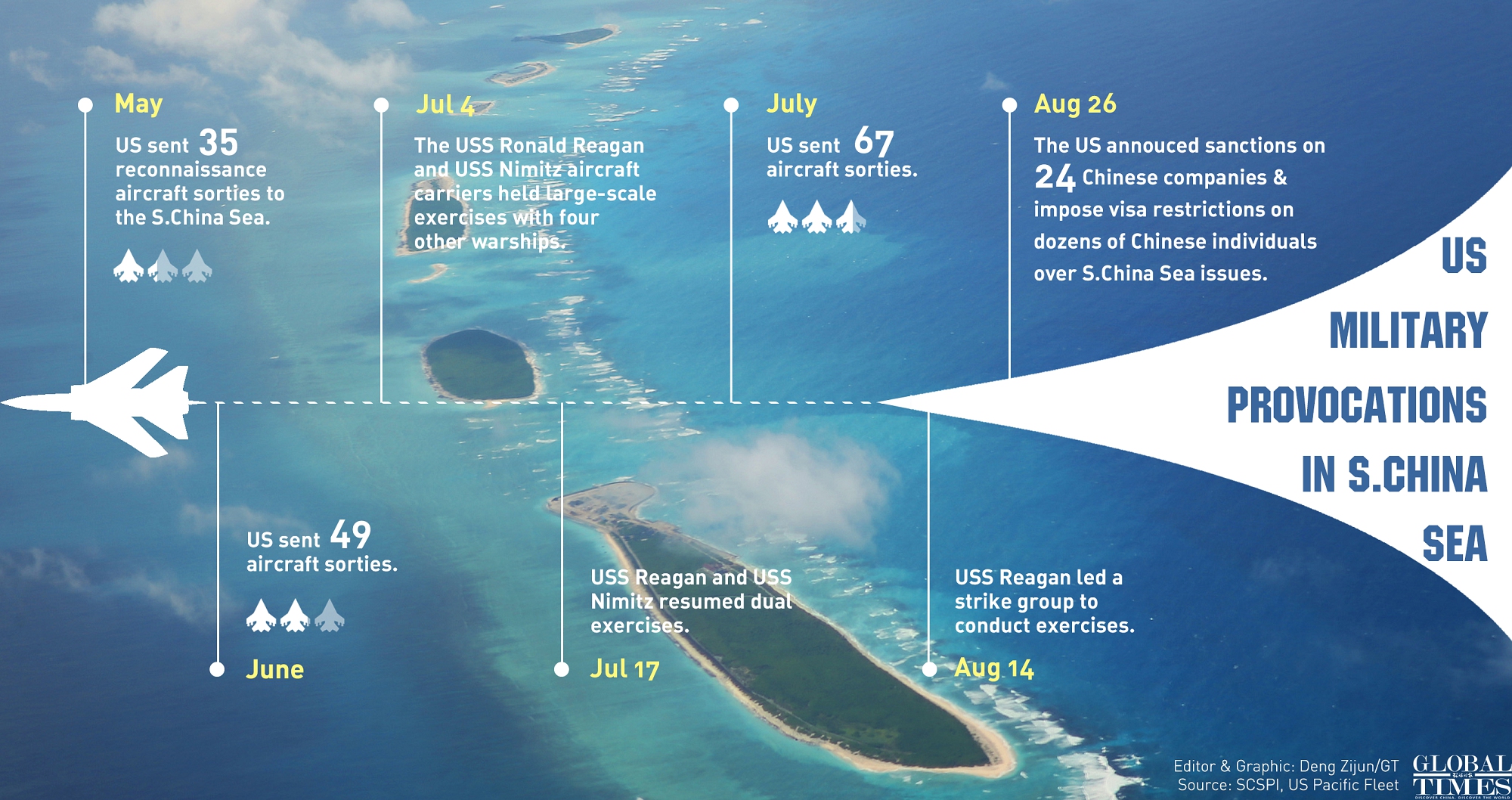US sanctions on firms over S.China Sea to have little impact, show its exhausted tricks: experts
By GT staff reporters Source: Global Times Published: 2020/8/27 20:38:40

Xisha Islands in the South China Sea Photo: VCG
Recent US sanctions on two dozen Chinese companies and certain individuals involved in infrastructure construction in the South China Sea are "illegal" and "hegemonic," which won't deter China from pursuing its legitimate territorial sovereignty and maritime rights and interests in the sea, observers said.
While the US ramps up efforts to play the South China Sea card to contain China, some politicians in the region, including the Philippines and Vietnam, are dancing to the US' tune, attempting to fish in disputed waters. Chinese experts warned that regional peace can only be reached through negotiations between relevant countries and without a non-claimant country messing things up.
This is the first time for the US to use the "Entity List" to sanction China on the South China Sea issue, following similar moves over Hong Kong and Xinjiang-related matters.
In response, Chinese Foreign Ministry spokesperson Zhao Lijian on Thursday said it is completely legitimate and reasonable to carry out infrastructure construction on China's own land. The illegal sanctions made by the US are based on its own hegemonic logic and power politics to rudely interfere in other countries' internal affairs.
China will take necessary measures to ensure the lawful rights of Chinese companies overseas, Zhao said, calling on the US to mind its own business and stop interfering with others.
The US Commerce Department previously announced the addition of 24 Chinese firms to the Entity List for helping the Chinese government "reclaim and militarize disputed outposts in the South China Sea," while the US State Department also said on Wednesday that it would impose visa restrictions on Chinese individuals involved in the construction.
Experts described it as another "symbolic" move aimed at fanning anti-China sentiment in certain quarters of the US ahead of the heated presidential election, but that won't deter China from pursuing its legitimate territorial sovereignty and maritime rights and interests in the South China Sea.
The sanctions show that the US is launching an all-round crackdown on China, be it on the diplomatic, military or public opinion front. But it also means that its tricks have been exhausted, as restrictions imposed on the Chinese companies involved in the South China Sea will have a very little impact on them, Chinese experts said.
The newly released sanctions may be another tactic of the Trump administration to play the "China card" to gain support within the US, as the general election approaches. "Neither international society nor Americans are paying close attention to the South China Sea region. The new move is just 'testing the waters' to see if targeting the region will gain more votes," Chen Xiangmiao, an assistant research fellow at the National Institute for South China Sea Studies, told the Global Times.

Graphic: GT
The US has always been hyping China's construction on islands and reefs in the region, so the sanctions are not surprising to some Chinese experts, as Washington has ratcheted up its crackdown on China on trade, so-called human rights and other issues.
The latest Entity List will restrict exports of US goods to the Chinese firms.
The China Communications Construction Company, one of the sanctioned companies, shrugged off the sanctions, saying in a notice on Thursday that the company's dredging business does not carry out any business in the US, and its core equipment does not use American technology.
The company said it focuses on dredging waterways in China, land dredging and environmental protection dredging in China, and its overseas business accounts for a relatively small proportion.
The push to move away from a US-centric road map, and the pursuit of legal actions are among the countermeasures being considered to ensure the survival of the affected Chinese businesses, said Bai Ming, deputy director of the international market research institute at the Chinese Academy of International Trade and Economic Cooperation, a think tank under the Ministry of Commerce.
A greater focus on the domestic market, continued commitments to the Belt and Road Initiative, and a push for breakthroughs in core technologies would be the key for China to build an indigenous innovation wall against the US-led crackdown on Chinese businesses and technologies, Bai said.
However, as the US ramps up efforts to play its cards on South China Sea issues and incite regional tensions, some politicians in the region are trying to dance to the tune of the US for their own purposes, regardless of the stable and peaceful situation.
Philippine Foreign Secretary Teodoro Locsin was quoted by South China Morning Post on Wednesday as saying that Manila will invoke its defense agreement with the US if China attacks Philippine naval vessels in the South China Sea.
The Global Times sent an interview request to the Philippine Foreign Ministry to confirm the news, but received no reply as of press time on Thursday.
Chen said that Locsin made the "groundless" hypothesis to cater to domestic nationalists and pro-American forces, as nationalist sentiments raised by former president Benigno Aquino III still linger in the Philippines.
Under the Duterte administration, the Philippines is working together with China to deal with their disputes through peaceful negotiations. However, some Philippine politicians hope that the US could offer them support to play tough on China, which is unrealistic, experts said.
Vietnamese Foreign Ministry spokeswoman Le Thi Thu Hang also released a statement on Wednesday, claiming that China's repeated military exercises in the South China Sea violate Vietnam's sovereignty and "complicated negotiations for a Code of Conduct of Parties in the South China Sea between China and ASEAN," Reuters reported.
"Vietnam's sovereignty claim over the Xisha Islands is illegitimate. As a known destroyer on the consultation of Code of Conduct (COC), Vietnam has deliberately delayed COC negotiations," said Cao Qun, a research fellow at the Center for Maritime Security and Cooperation of the China Institute of International Studies.
Some Vietnamese politicians are working with the US to play the South China Sea card, and try to shift the blame on China for affecting regional peace. But far-sighted leaders in the region agree that stability can only be realized by talks among relevant countries and without a non-claimant nation messing things up, experts said.
RELATED ARTICLES:
Posted in: DIPLOMACY